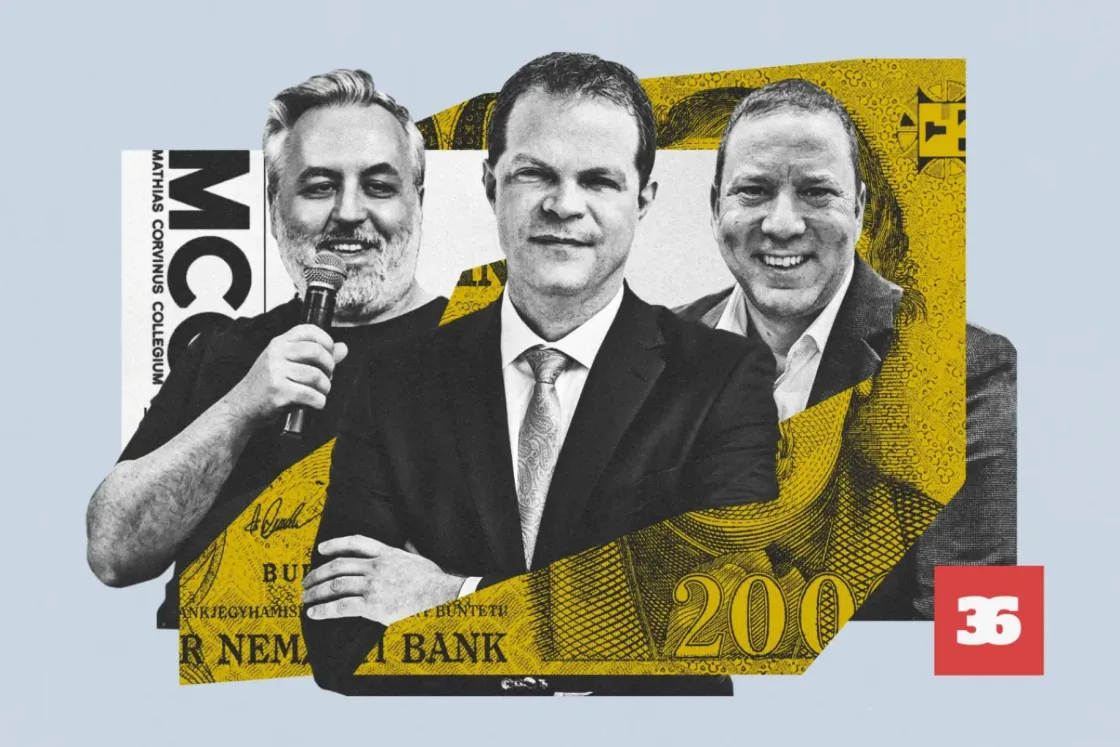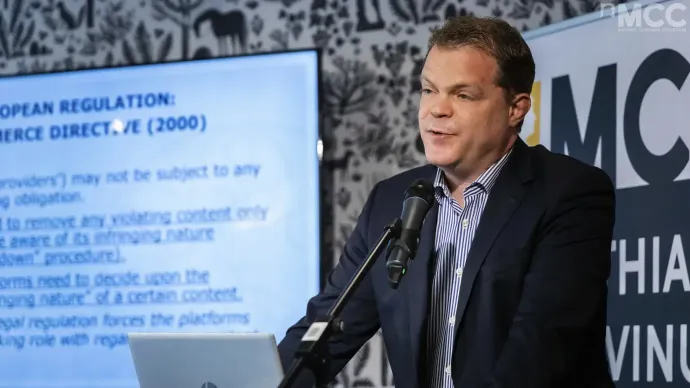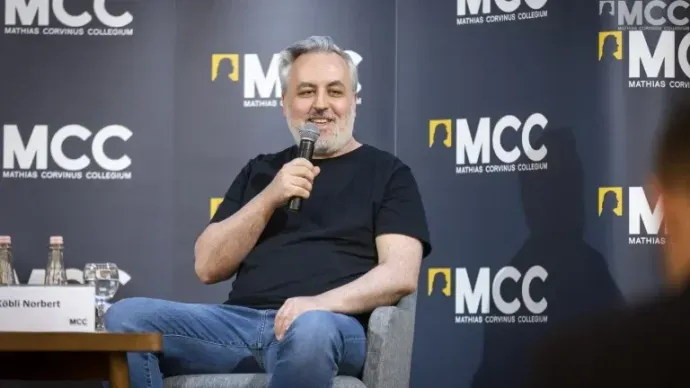Outstanding salaries, incosistent performance among teachers – new internal data leaked on MCC spendings

András Koltay holds a serious and responsible position as the president of the National Media and Infocommunications Authority (NMHH) and the Media Council, but he cannot complain about lacking other well-paid side jobs.
As NMHH’s leader, his salary can reach a gross monthly amount of 4.8 million forints (12 thousand euros) according to the latest available information from 2022. Additionally, he teaches at two universities and is a board member of a foundation established by the Parliament, for which he receives a gross monthly fee between 1.2 and 2.5 million forints (between 3 thousand and 6,300 euros) according to his latest asset declaration.
The list of jobs and salaries doesn’t end there. Koltay also works for the pro-government Mathias Corvinus Collegium (MCC), which is heavily supported by taxpayer money, as the head of the Center for Freedom of Speech. According to documents obtained by Direkt36 containing payroll data for 2023, the unit’s annual salary cost – including taxes and contributions – was 12 million forints, while Koltay was the only employee of the organization.
As stated in the documents, this is a part-time position, meaning that Koltay is listed as working 20 hours per week. We asked him how he managed this workload in addition to his full time job at the NMHH and other commitments, but he did not respond, so he also did not disclose the exact net amount he receives for his work at MCC.
Based on internal records in our possession, it doesn’t look like Koltay had too much to do as head of the center. The 2023 documents show that the workshop had no other staff members or so-called workshop members (former MCC students conducting research there).
The list of the center’s achievements mentions several publications, conferences, and two courses, but no details were provided about these. Additionally, the report stated that Koltay was a speaker at 32 events, two of which were organized by MCC. Since Koltay did not respond to our questions, it remains unclear whether he participated in the other events as the head of the MCC unit or in another capacity.
Koltay’s activities within MCC did not attract much attention. Several sources from the college, working in the same building where Koltay’s center is located said they were unaware of any significant educational activity linked to Koltay or his unit. Several individuals, including students, only found out from our questions that Koltay had any connection to MCC at all, as they had not seen him at the institution during the past year.
Koltay’s is not the only organizational unit where significant money is spent on salaries without clear signs of substantial work. In another center, based on documents, it appears that the entire annual salary cost of 48 million forints was allocated to one person – the head teacher.
These salaries are signficantly higher than what teachers receive at other vocational colleges or even in senior positions at universities, while the individuals teaching there often face much higher expectations.
Reports on the pro-government MCC’s spendings of taxpayer money have surfaced before. In the spring of 2023, Direkt36 revealed, based on internal documents, that the institution spends a great deal on luxury food and beverages, as well as travel. For example, their 2023 winter camp, which cost 100 million forints, was held at a four-star hotel in Slovakia, and snails and champagne were served during one of the events.
During its nearly 30-year existence, MCC has always been considered close to Fidesz, but it has received special government attention only since 2020. In that year, the institution received direct state support and properties worth hundreds of billions of forints from the government. In a government decision, 10% of shares in Mol Nyrt. and Richter Gedeon Nyrt. were also transferred to the institution, amounting to around 420 billion forints.
We sent a detailed list of questions to MCC and the head teachers about the high salaries and the educational work taking place in their educational units. MCC’s press office did not respond substantively to most questions, though they noted that there were inaccuracies in the financial data we referred to, but they did not clarify what they meant by this. In their response, they emphasized that the staff mentioned in our questions are “nationally and internationally recognized professionals, all among the best in their fields, and are key educators of MCC.”
The Story Laboratory
MCC offers a wide range of programs from upper primary education to postgraduate courses. The Center Membership Program is a unique educational format available to students who have completed the MCC school system and envision a future in research. Participants in the program work closely with the center’s leader and researchers on selected research projects for one to two years, while continuing to receive dormitory accommodation and a monthly scholarship.
According to the institution, the goal is for “MCC students interested in research to get a taste of what a scientific career might be like in everyday life.”

There are many centers, ranging from journalism to corporate communication and film education. The latter is called the MCC Story Lab, which also offers high salaries to its tutors.
According to leaked documents, last year the Story Lab employed only one person – screenwriter Norbert Köbli – full-time as the center’s leader. The organizational unit’s total salary cost, according to the documents in our possession, was 48 million forints in 2023, meaning the employer’s total cost for employing one person was this amount. This equates to a monthly salary of four million forints, which, after taxes, could have been roughly 2.3 million forints (or 5,800 euros – the exact amount depends on various tax deductions and the specific form of employment).
Norbert Köbli is one of the most frequently employed screenwriters in Hungary’s current movie subsidy system and has been awarded several state honors. In recent years, films such as The Game, Tall Tales, Eternal Winter, and the documentary on swimmer Katinka Hosszú, Katinka, are linked to his name, as well as The Blockade, Hungary’s 2022 Oscar submission. All of these films received state funding, and public money was allocated for the development of their screenplays in advance. Köbli’s current project, a biographical film about Ferenc Puskás, also received four million forints of state support for its script.
According to the leaked documents, Story Lab only had one member in 2023. The report also listed Köbli’s tasks during the year, which included teaching several courses, participating as a speaker at several MCC events, running a film club at the Winter Academy, and ensuring “teacher presence” at the Media School’s “summer camp.” Additionally, the report mentioned that Köbli was involved in organizing the Budapest lecture of renowned conservative psychologist Jordan Peterson and participated in a discussion with Bálint Szentgyörgyi, creator of the Hungarian HBO series The Informant, at Scruton Café.
Köbli is not only involved with teaching at MCC. A month after the foundation that oversees the institution acquired a 98.41% stake in the Libri-Bookline book publishing group in June 2023, Köbli was appointed to the company’s board, where he received a monthly fee of 350,000 forints for his work that year.

We also asked Norbert Köbli how he divides his time between his duties and what educational work he performs within Story Lab. Wishing us well, he responded that MCC’s press office would answer our questions. They did not provide substantive answers to most inquiries, but they emphasized Köbli’s well-known works and noted that he is currently developing an exciting, large-scale screenplay on behalf of MCC, the details of which will be publicly announced in the near future.
Join the Direkt36 supporters’ group and get insight into investigative journalism! Details →
One of Köbli’s social media posts suggests that he holds MCC in high regard. When actor Miklós Vecsei H. expressed “great disappointment” on his Facebook page regarding our article on MCC’s lavish spending and expressed solidarity with MCC students, Köbli passionately defended the institution in a comment.
“For years, I’ve been teaching courses at MCC, attending events, visiting the talent centers in Pécs, Győr, Szombathely, Szeged, Debrecen, Miskolc, Cluj-Napoca, Târgu Mureș, Miercurea Ciuc, and Sfântu Gheorghe. Everywhere, I’ve witnessed the highest level of professional work, expertise, and productivity,” Köbli wrote, adding that students, teachers, and MCC employees work hard and “deserve something better than what they received from you today.”
“Not primarily of scientific nature”
Based on the leaked documents, it is also questionable how serious the educational work is in the centers.
For instance, the report from the Center for Diplomacy states that in September 2023, only 2 percent of the expected average teaching hours were fulfilled, and in October, it was 8 percent. Additionally, the head of the workshop, former diplomat Rajmund Kiss, acknowledged that his activities were not always of scientific nature.
“It is not primarily scientific in nature or purpose, but this year, I have had over 500 media appearances, ranging from more than 200 cover stories to live TV appearances in eight different national media outlets,” Kiss wrote in his work report. By TV appearances, he likely refers to his roles on ATV, Hír TV, Hit Radio, and M1, as Kiss appeared regularly in weekly analysis and debate shows throughout 2023, mainly discussing current foreign policy issues.
Besides his work at MCC, Kiss currently also works as an American election expert for M1. According to his public Facebook page, he spends most of his time in the United States, where, for example, he reported on Donald Trump’s campaign events during the summer of this year.
In 2022, the salary costs for this educational unit were 36.3 million forints, most of which likely went to Kiss, as the workshop only had one additional part-time research teacher on record.
The report from the Sports and Performance Workshop lists activities that seem substantive but also includes entries that are less comprehensible from a scientific or professional standpoint. Among their 2023 achievements, they list “3 gym sessions and one warm-up.” In response to our question about the gym and warm-up, MCC stated that the institution regularly organizes “sports events for students, employees, and their families.”
MCC clearly places a great deal of emphasis and resources on media presence, which is also reflected in the performance evaluations mentioned in the leaked documents. Every workshop was asked to provide the number of media appearances, broken down by year or month, and several workshops listed the details of when, on what topic, and in which medium they appeared. In 2023, the Migration Research Institute recorded 1,421 media appearances, the Geopolitical Center had 579 (for its five members), and the Center for European Studies had 82.
Big names, big sums
However, there are workshops where notable professional work is taking place, and salaries are not excessive.
Since 2022, the Center for Modern Legal Studies has been led by Attila Menyhárd, who, in addition to his role at MCC, teaches at ELTE’s Faculty of Law, where he is a former department head and dean. He played a key role in the codification of the 2013 Civil Code, and in recognition of his work, he was awarded the Officer’s Cross of the Order of Merit of Hungary that same year. “He was already a big name in the Hungarian legal community before MCC,” said MCC students, who noted that some students do not understand why he took the job, given that some workshop leaders are less qualified than he is.
Menyhárd’s salary was also revealed in the documents: in 2023, the annual gross salary cost of his unit was 18 million forints, which corresponds to a net monthly salary of around 880,000 forints. The documentation shows that in 2023, Menyhárd’s workshop had two members, a junior and a PhD researcher, and they held a total of seven courses in Budapest and the provinces, organized two of their own events, presented at 18 MCC and external conferences, and published 11 scientific papers in domestic and international journals. As for media appearances, only one radio appearance by Menyhárd was recorded.
The disparity between salaries and performance has not gone unnoticed within the institution. “I’ve never seen an organization of nearly a thousand people where the lack of standardized processes is so severe, like what is expected of employees, how salaries are determined, and what criteria must be met for advancement,” said a source close to MCC, describing the institution’s salary practices.
From the leaked data, it’s not always possible to clearly determine individual salaries, but the signs suggest that salaries in the millions – or even multiple millions – are not uncommon.
In 2023, the total wage expenditure of their Center for Journalism unit was 54.2 million forints, from which MCC employed 2.5 people. Of these, only the workshop leader, Boris Kálnoky, a German-Hungarian journalist who regularly posts government-sympathetic content on his account on the social media platform X, was employed full-time, so it is likely that he received the majority of this amount.
The Center for European Studies, led by former diplomat Rodrigo Ballester, had four full-time employees, and their total wage costs were 60.7 million forints. Besides his work at MCC, Ballester was appointed a ministerial commissioner by former Minister János Csák in March 2024, and his successor, Balázs Hankó, kept him in the position. In addition to his salary as a leader of an MCC workshop, Ballester is also entitled to a gross salary of 1.3 million forints and other benefits for his part-time duties.
Staff at other educational institutions were taken aback when they heard about the salaries at MCC. “In academia, these salaries are completely unheard of, even when tied to performance, let alone without it,” said a lecturer at ELTE regarding the million-forint salaries of MCC workshop leaders.
The source works 12 hours a week, supervises theses, and writes publications, with a base salary of 320,000 forints net per month, plus a performance-related supplement of around 100,000 forints gross. We also spoke with a university department head and institute director who takes home 460,000 forints net per month with all allowances included.
Of course, MCC is not a higher education institution, rather something similar to a vocational college, where students enrolled at various universities can further their education in different fields. However, MCC’s salary structure is striking not only compared to universities but also to other specialist colleges with similar functions. At the three specialist colleges we contacted, the highest salary among leaders was 375,000 forints net, while many take on leadership roles entirely on a voluntary basis.
This article is part of a partnership between Telex and Hungarian investigative journalism center Direkt36.